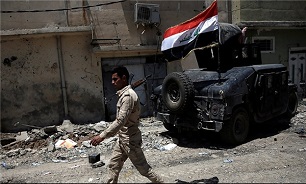Popular Forces to Take Part in Tal Afar Operation
 Speaking at a youth meeting on Saturday, Abadi said the
government and security commanders have devised a plan to dislodge Daesh from
Tal Afar, West of Mosul, which requires participation of security personnel as
well as Hashd al-Shaabi and tribal fighters, Arabic-language Nabaa news agency
reported.
Speaking at a youth meeting on Saturday, Abadi said the
government and security commanders have devised a plan to dislodge Daesh from
Tal Afar, West of Mosul, which requires participation of security personnel as
well as Hashd al-Shaabi and tribal fighters, Arabic-language Nabaa news agency
reported.
He added that the Iraqi nation, through complete commitment to its unity, could overcome sectarian and ethnic divisions.
"The entire world is breathing a sigh of relief now that Iraqis have chopped Daesh's head off. The international community threw its weight behind Iraq in the fight against terrorism, because it found the Iraqi nation full of determination to battle Daesh,” Abadi pointed out.
The Iraqi prime minister further noted that Baghdad is after balanced relations with world countries, stressing that he will not compromise on his country’s interests with anyone.
Abadi had announced days ago that military plans were ready to invade ISIL’s last haven in Nineveh, asserting in the meantime that foreign militants would not be spared accountability.
Speaking during his weekly press briefing, Abadi stressed that "a special plan” had been laid down for the liberation of the town of Tal Afar, a major ISIL stronghold West of Mosul that has been isolated encircled by security forces and allied volunteer forces.
ISIL had announced Tal Afar town as an independent state from the group's proclaimed caliphate, after Iraqi forces managed to recapture Mosul in mid-July.
"ISIL leadership in Tal Afar declared in a brief statement that the town has become an independent state from the caliphate and threatened strict punishment against whoever violates order,” the source said, Al Sumariya reported.
Speaking on condition of anonymity, the source added that "Tal Afar has been completely controlled by Arabs and foreigners with no local leaders in the wake of the mass executions that was carried out over the past few weeks.”
The group, according to the source, considered the town as independent with its leaders, which marks a sudden development that comes one day after the group announced the murder of its supreme leader Abu Bakr al-Baghdadi.
Meanwhile, ISIL terrorists have started mass execution of their own family members in the town of Tal Afar following release of news about the Iraqi forces' imminent operation to liberate the town.
A source disclosed that the ISIL's Religious Board has issued the Fatwa for the mass killing of family members before the start of the Iraqi forces' operation in order not to be exposed and handed over to the army men by the family members in Tal Afar.
The Iraqi Army announced in July 10 that Baghdad forces has recaptured the key town of Mosul, ISIL's de facto capital in the Arab country, after 9-month of bloody battle with the Takfiri terrorists in Nineveh province.
According to an Iraqi commander that led the war to retake Iraq’s second largest city, security operations against the ISIL militants in Mosul left 25,000 militants killed.
Lt. Gen. Abdul-Amir Yarallah, head of the Nineveh Operations at the Joint Operations Command, said in a briefing that more than 25,000 militants were killed over the nine months of battles, including more than 450 suicide bombers.
He added that Iraqi forces destroyed 1,247 booby-trapped cars and shot down 130 drones belonging to the group besides more than 1,500 diverse vehicles.
The commander declared that the JOC fought the battle with more than 100,000 government and paramilitary troops.
Iraqi Prime Minister Haider al-Abadi announced in October 2016, the start of a military operation to recapture Mosul.
Baghdad declared earlier in January that the Iraqi troops managed to capture the Eastern part of the key ISIL stronghold in Nineveh province. The Iraqi Army started a new phase of its military operation late February to drive the ISIL terrorists out of their bastion in the Western part of the city of Mosul.
The second largest city in Iraq fell to the ISIL group in 2014, when the Takfiri terrorists began a campaign of death and destruction in the Arab country.
The United Nations predicted that it will cost more than $1 billion to repair basic infrastructure in Mosul. In some of the worst affected areas, almost no buildings appear to have escaped damage.
An estimated 862,000 people have been displaced from Mosul ever since the battle began nine months ago. A total of 195,000 civilians have also returned to the liberated areas of Eastern and Western Mosul.
UN Coordinator for Iraq Lise Grande had announced that an estimated 700,000 residents who remain displaced from their homes in Mosul after the city’s liberation from ISIL will need between $182 million and $450 million in aid.
The UN estimates are based on three possible scenarios, depending on the amount of time required before displaced Mosul residents can return, Grande explained, Sputnik reported.
"The fighting may be stopping, but the humanitarian crisis has not," Grande stated.
Humanitarian support needed for three months is estimated at $182 million, rising to $450 million if nine months are required before displaced residents can return to the devastated city, Grande noted.
According to the UN data, there are 3.4 million people who remain displaced from their homes across Iraq, prompting appeals for up to $1 billion in humanitarian aid.
In Mosul alone, the number of civilians outside of their homes is as high as 700,000 people, Grande said.
In addition, Grande warned that intense fighting is expected to take place in three areas of Iraq where ISIL retains a foothold, with the possibility that an additional 100,000 civilians will flee before the terrorist group is ultimately expelled from Iraq.
